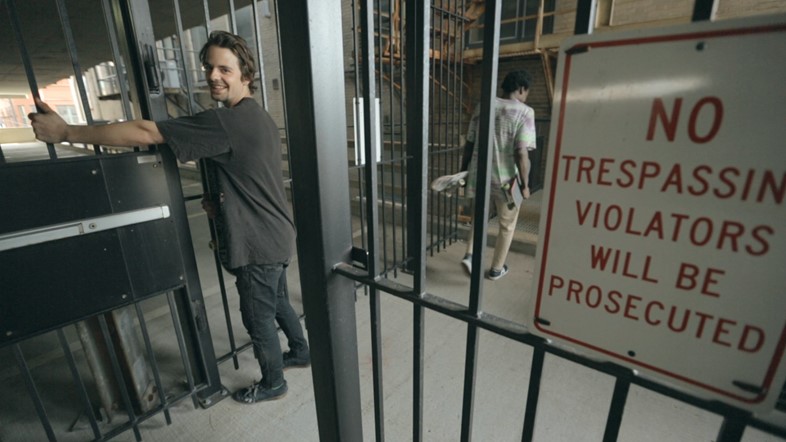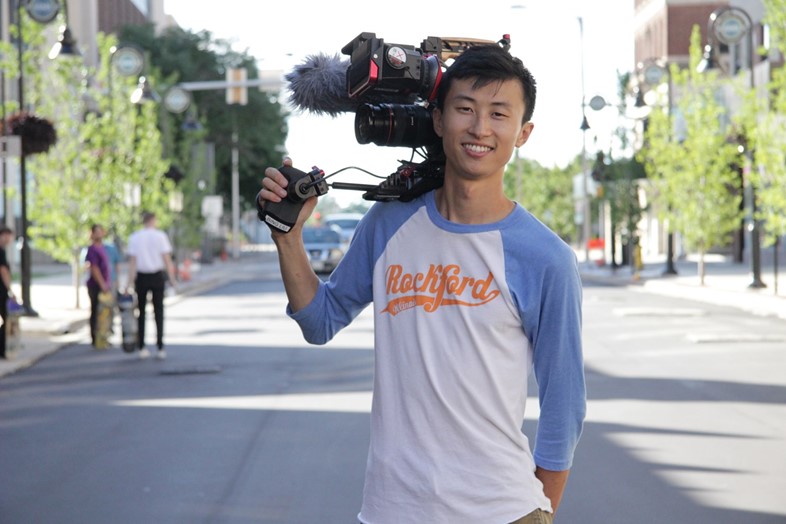Director Bing Liu discusses the making of Minding the Gap, which is nominated for Best Documentary Feature at this weekend’s Academy Awards
- TextHannah Clugston
Bing Liu, the 30-year-old director behind Oscar-nominated Minding the Gap, is reluctant to call his documentary a “skater film” – even though there’s plenty of footage of airborne skaters, tussling with gravity to stay upright. There’s the sound of wheels racing over smooth tarmac and the crunch of board against unforeseen obstacles. There are hoots of triumph, there are yells of pain, there are gangs of teenagers sloping around ramps and rails.
But still, Liu is not having it. “Most of the film deals with things that skateboarding can’t do anything about,” he explains over a drink in the relaxed demeanour you’d expect from a skateboarding filmmaker. “In reality there’s probably like five or ten minutes of skating in the 93-minute film. There are lots of universal truths, realities, struggles and challenges that a lot of people can latch onto in the film.”
One of those struggles is “the gap” between adolescence and adulthood; the moment the ground moves out from beneath you and you find the world is yours to master. Liu weaves together the tales of numerous friends who are undergoing this transformation in the not-so-prosperous area of Rockford, Illinois. Having grown up together – shooting DIY footage and skate videos from the age of 14 – Liu was perfectly placed to delve into these stories, focusing in particular on Zack and Kiere.

“I was the guy at high school who cornered someone in the hallway and got them to talk about their parents while people were playing beer pong in the living room,” Liu laughs in response to a question about whether it was a strange process interviewing his friends. “I understood what Zack, Kiere and what a lot of the other guys were going through. We would film skating, they’d get their release and then they’d feel comfortable, which was the time to start asking questions.”
The intimacy of Minding the Gap is credit to Liu’s approachable character and skill in creating an environment where his friends felt able to express themselves even in front of a camera. At one point, Kiere refers to the interview process as “therapy”, and Liu later discovered that both Kiere and Nina (Zack’s girlfriend) weren’t sharing any of their problems with anyone but him. It is during these quite intense interviews that layers of emotional and physical trauma begin to unravel, revealing the far-reaching effects of domestic violence.
In the first 20 minutes a tearful Kiere recounts getting “disciplined” by his father – “they call it child abuse now” he adds. Liu asks, “did you ever cry?” “Of course,” comes the answer, “I mean, wouldn’t you?” There’s a pause. “I did cry,” answers Liu. Suddenly the shots of teenage boys racing manically on boards and flinging themselves off ramps takes on a different meaning. Skating isn’t just for fun – it’s an escape necessary for survival. Minding the Gap isn’t just therapy for the subjects but Liu himself, who had spent his adolescence skating away from the home where his step father reigned supreme, physically assaulting Liu, his half-brother and his mother.

In researching the documentary, Liu kept stumbling upon young men who relied on skating as an emotional outlet. “When I first started the project, it was a multi-character film from all over the States. One of the things that I talked about on top of parents and growing up, was emotions – like, what people’s inner emotional lives felt like. For boys especially, it was just very clear that they didn’t have an outlet for it. Sometimes they had to sort of triage and express it, and sometimes they felt they had to hide it from the outside world or from their most trusted peers.”
If anything, Minding the Gap is a warning that regardless of the catharsis involved in speeding around on four wheels, skating can’t heal the wounds of emotional trauma. Staying silent on a board or even smashing a board to pieces doesn’t help anyone. “A lot of the time people just don’t feel like they can really process their emotions with anyone in their lives, and that becomes a really lonely feeling and I think it can produce some unhealthy tendencies. In the documentary we see those effects in real time without anybody really having to talk about it in a way that feels too explicit.”
Lui’s film has really struck a chord, picking up an Oscar nomination for Best Documentary Feature and accolades from nearly every film festival going. It’s not just skaters drawing parallels from it either, but women who identify with Nina’s story of domestic violence, and – according to Lui – an unnamed journalist who ended up crying on the kitchen floor at the memory of his own abusive father. Although the young director finds his Academy Award nomination “insane and unreal”, he is pretty clear about why he thinks the documentary resonates. “You don’t typically hear young people open up about trauma because of the emotional toil of trying to make sense of it all” he explains. “I think, often, it is dismissed as something angsty or something to just get over, but so many things that young people experience as they grow up are so relatable.”
Minding the Gap is nominated for Best Documentary Feature at the 2019 Academy Awards. It is released in the UK in March 2019.











